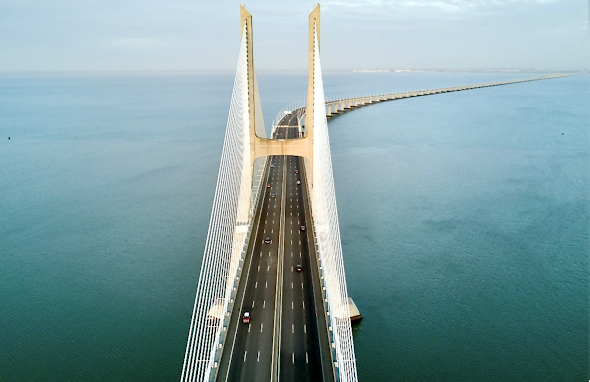The Podcast Bridges
The Podcast Bridges
"We build too many walls and not enough bridges."
by Isaac Newton
"If you were successful, somebody along the line gave you some help... Somebody helped to create this unbelievable humanity system that we have that allowed us to thrive. Somebody invested in roads and bridges. If we've got a business - we didn't build that. Somebody else made that happen."
by Barack Obama
In a month or so, I will launch Bridges, -PODCAST-, of which I already anticipate that I will never be The Message, but quite the opposite, I will be The Messenger.
My Executive Producer is one of the best in the world, PP -Pancho Poluyan-Buenos Aires, Argentina, one of the most elegant cities on this side of the Atlantic and Pacific.
With the due permission of Maryana Iskander, the CEO of Wikipedia and its founder, Steven Pruitt, I transcribe as is and thanks to the high professional clarity, with zero bias from Wikipedia, the facts that define the PODCAST concept.
PODCAST
Podcast is a program made available in digital format for download over the Internet. For example, an episodic series of digital audio or video files that a user can download to a personal device to listen to at a time of their choosing. Streaming applications and podcasting services provide a convenient and integrated way to manage a personal consumption queue across many podcast sources and playback devices. There are also podcast search engines, which help users find and share podcast episodes.
A Podcast series usually features one or more recurring hosts engaged in a discussion about a particular topic or current event. Discussion and content within a podcast can range from carefully scripted to completely improvised. Podcasts combine elaborate and artistic sound production with thematic concerns ranging from scientific research to slice-of-life journalism. Many podcast series provide an associated website with links and show notes, guest biographies, transcripts, additional resources, commentary, and even a community forum dedicated to discussing the show's content.
The cost to the consumer is low, with many podcasts free to download. Some podcasts are underwritten by corporations or sponsored, with the inclusion of commercial advertisements. In other cases, a podcast could be a business venture supported by some combination of a paid subscription model, advertising or product delivered after sale. Because podcast content is often free, podcasting is often classified as a disruptive medium, adverse to the maintenance of traditional revenue models.
Podcasting is the preparation and distribution of audio files using RSS feeds to the devices of subscribed users. A podcaster normally buys this service from a podcast hosting company like SoundCloud or Libsyn. Hosting companies then distribute these audio files to streaming services, such as Apple and Spotify, which users can listen to on their smartphones or digital music and multimedia players, like an iPhone.
As of December 2022, there are at least 2,999,008 podcasts and 152,596,784 episodes.
A Podcast generator maintains a central list of the files on a server as a web feed that one can access through the Internet. The listener or viewer uses special client application software on a computer or media player, known as a podcast client, which accesses this web feed, checks it for updates, and downloads any new files in the series. This process can be automated to download new files automatically, so it may seem to listeners as though podcasters broadcast or "push" new episodes to them. Podcast files can be stored locally on the user's device, or streamed directly. There are several different mobile applications that allow people to follow and listen to podcasts. Many of these applications allow users to download podcasts or stream them on demand. Most podcast players or applications allow listeners to skip around the podcast and to control the playback speed.[6]
Podcasting has been considered a converged medium (a medium that brings together audio, the web and portable media players), as well as a disruptive technology that has caused some individuals in radio broadcasting to reconsider established practices and preconceptions about audiences, consumption , production and distribution.
"Podcast" is a portmanteau of "iPod" and "broadcast". The earliest use of "podcasting" was traced to The Guardian columnist and BBC journalist Ben Hammersley, who coined it in early February 2004 while writing an article for The Guardian newspaper. The term was first used in the audioblogging community in September 2004, when Danny Gregoire introduced it in a message to the iPodder-dev mailing list, from where it was adopted by podcaster Adam Curry. Despite the etymology, the content can be accessed using any computer or similar device that can play media files. The term "podcast" predates Apple's addition of podcasting features to the iPod and the iTunes software. Some sources have suggested the backronym "portable on demand" or "play on demand" for POD to avoid the loose reference to the iPod. This usage has been criticized as a retcon by tech blogger John Gruber.
Podcasts can be produced at little to no cost and are usually disseminated free-of-charge, which sets this medium apart from the traditional 20th-century model of "gate-kept" media and their production tools. Podcasters can, however, still monetize their podcasts by allowing companies to purchase ad time. They can also garner support from listeners through crowdfunding websites like Patreon, which provide special extras and content to listeners for a fee.
In October 2000, the concept of attaching sound and video files in RSS feeds was proposed in a draft by Tristan Louis. The idea was implemented by Dave Winer, a software developer and an author of the RSS format.
Podcasting, once an obscure method of spreading audio information, has become a recognized medium for distributing audio content, whether for corporate or personal use. Podcasts are similar to radio programs in form, but they exist as audio files that can be played at a listener's convenience, anytime and anywhere.
The first application to make this process feasible was iPodderX, developed by August Trometer and Ray Slakinski. By 2007, audio podcasts were doing what was historically accomplished via radio broadcasts, which had been the source of radio talk shows and news programs since the 1930s. This shift occurred as a result of the evolution of internet capabilities along with increased consumer access to cheaper hardware and software for audio recording and editing.
Types of Podcasts.
- Podcasts vary in style, format, and topical content.
- Podcasts are partially patterned on previous media genres but depart from them systematically in certain computationally observable stylistic respects.
- The conventions and constraints which govern that variation are emerging and vary over time and markets; Podcast listeners have various preferences of styles but conventions to address them and communicate about them are still unformed. Some current examples of types of podcasts are given below. This list is likely to change as new types of content, new technology to consume podcasts, and new use cases emerge.
Enhanced Podcasts
- An enhanced podcast, also known as a slidecast, is a type of podcast that combines audio with a slide show presentation.
Fiction Podcast.
- A fiction podcast (also referred to as a "scripted podcast" or "audio drama") is similar to a radio drama, but in podcast form.
Podcast Novels
- A podcast novel (also known as a "serialized audiobook" or "podcast audiobook") is a literary form that combines the concepts of a podcast and an audiobook.
Video Podcast
- A video podcast is a podcast that contains video content A video podcast on the Crab Nebula created by NASA
Live Podcasts
- A number of podcasts are recorded either in total or for specific episodes in front of a live audience.
Software
- Podcast episodes are widely stored and encoded in the mp3 digital audio format and then hosted on dedicated or shared webserver space.
- Syndication of podcasts' episodes across various websites and platforms is based on RSS feeds, an XML-formatted file citing information about the episode and the podcast itself.
Hardware.
- The most basic equipment for a podcast is a computer and a microphone.
- It is helpful to have a sound-proof room and headphones.
- The computer should have a recording or streaming application installed. Typical microphones for podcasting are connected using USB.
- If the podcast involves two or more people, each person requires a microphone, and a USB audio interface is needed to mix them together. If the podcast includes video (livestreaming), then a separate webcam might be needed, and additional lighting.
__O__
BRIDGES AT THE PENTHOUSE
Trillions and trillions of stimuli reach us at the Penthouse and they begin to ferment in the alembic. And from there, to the cellar where ideas will be born and where ideas shall aged…Ideas that can never be assassinated or eliminated. As thousands of good examples demonstrate...from those in the Caves of Altamira and further back, to the message recorded on the Voyager Spacecraft Resources Twin Robotic Lost in Space, among others.
Carlos Ignacio Yanes, through Bridge, wants to transport to those free humans and of good will, the messages that he ferment and age within the Penthouse.
Messages that when kneaded cross bridges to reach thoughts, ideas. The Light of giant Beacons arrive at the Penthouse. Its light keepers or messengers have already left, leaving us messages that reach intermittently, those that continue to be projected infinitely and perpetually. Extremes that have no Extremes... because the guardian of absolute freedom, Chaos, would never allow it.
Let's start.




Comments
Post a Comment